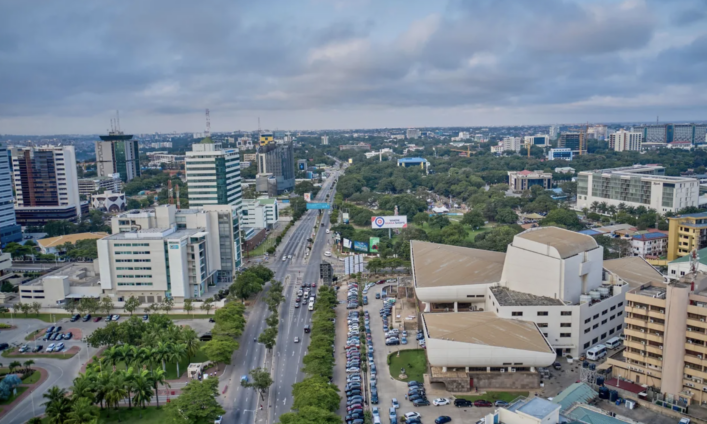The World Bank in its eighth Ghana Economic Update, says the country has seen ‘steady progress’ in the past year towards economic stabilisation though challenges remain.
The report attributed what it described as a “modest recovery” in the Ghanaian economy to a firm monetary policy stance, comprehensive debt restructuring, and a series of structural reforms to support long-term growth.
It, however, indicated that financial sector stress, contingent liabilities in the cocoa and energy sectors, and election expenditure slippages could pose challenges to the economy’s sustainable stability.
It encouraged the government to enhance tax revenue mobilisation through robust measures, and fully implement other policies in respect of the ongoing $3 billion International Monetary Fund (IMF) loan-support programme.
The report, themed, “Strengthening domestic revenue systems for fiscal sustainability”, was launched by Mr Stefano Curto, Lead Economist for Ghana, Liberia, and Sierra Leone at the World Bank, in Accra, on Monday, July 22.
“The macroeconomic situation has improved considerably over the past year… growth in 2023 was more resilient than projected, reaching 2.9 per cent. It is important to emphasise that Ghana has made commendable strides on fiscal consolidation,” said Mr Curto.
“However, the sustainability of these efforts hinges on a fundamental aspect – enhancing the country’s tax revenue while minimising the impact on growth and the poor and most vulnerable,” he noted.
He recommended that the government streamline and solve the complexities regarding personal income tax, Value Added Tax (VAT) and excise duty, corporate income tax, and rationalise tax exemptions.
He also stated that the country’s path to sustainable fiscal consolidation was inextricably linked to its ability to enhance tax revenue, encouraging the government to ensure that policies in that regard were robust and resilient.
Mr Kwabena Gyan Kwakye, Economist, World Bank, Ghana, also asked the government to “steadfastly continue with the efforts that have been made, including expenditure management.”
While projecting a 3.1 per cent growth for Ghana by the end of 2024, Mr Gyan Kwakye said full implementation of stabilisation efforts could lead to five per cent economic growth by 2025.
Admitting the challenges in the country’s tax administrative system, Dr Alex Ampaabeng, Deputy Finance Minister, said the government had initiated reforms to make the system fit for the purpose of increasing domestic revenue mobilisation.
“While a number of factors contributed to going to the IMF, surely, revenue is a critical part because Ghana’s tax-to-gross Domestic Product (GDP) has been very low, and now that we’re even up, we’re under 15 per cent,” he said.
That, he noted, led to the design of the National Revenue Policy in 2023, and a subsequent medium-term revenue strategy to have a system that recognised the changing dynamics of the business community.
Dr Ampaabeng said the Ministry of Finance was working actively with the Ghana Revenue Authority (GRA), the country’s revenue mobilisation agency, on data cleansing to identify taxpayers.
Currently, about 7.4 million taxpayers are in the country’s database, nonetheless, 1.9 million are active taxpayers, with some 5.4 million others being inactive, while the remaining one million eligible taxpayers are dormant.
“What we’re doing now is to have accurate data on who is doing what. With the digitisation of addresses, linking of Ghana card with bank accounts and businesses, it’s much easier to access taxpayers,” he said.
The World Bank’s Ghana Economic Update is to inform public discussion on economic issues and policy trade-offs and facilitate the dialogue among stakeholders to build consensus.
It is also to ensure necessary reforms to enhance macroeconomic management and accelerate progress towards sustainable and inclusive growth, looking at the medium-term economic outlook and potential risks going forward.
Latest Stories
-
CLOGSAG vows to resist partisan appointments in Civil, Local Government Service
56 minutes -
Peasant Farmers Association welcomes Mahama’s move to rename Agric Ministry
58 minutes -
NDC grateful to chiefs, people of Bono Region -Asiedu Nketia
1 hour -
Ban on smoking in public: FDA engages food service establishments on compliance
1 hour -
Mahama’s administration to consider opening Ghana’s Mission in Budapest
1 hour -
GEPA commits to building robust systems that empower MSMEs
1 hour -
Twifo Atti-Morkwa poultry farmers in distress due to high cost of feed
1 hour -
Central Region PURC assures residents of constant water, power supply during yuletide
1 hour -
Election victory not licence to misbehave – Police to youth
1 hour -
GPL 2024/2025: Nations thrash struggling Legon Cities
1 hour -
Electoral offences have no expiry date, accountability is inevitable – Fifi Kwetey
1 hour -
Ghanaians to enjoy reliable electricity this Christmas – ECG promises
1 hour -
Police deny reports of election-related violence in Nsawam Adoagyiri
1 hour -
‘We’re not brothers; we’ll show you where power lies’ – Dafeamekpor to Afenyo-Markin
1 hour -
EPA says lead-based paints are dangerous to health, calls for safer alternatives
3 hours

